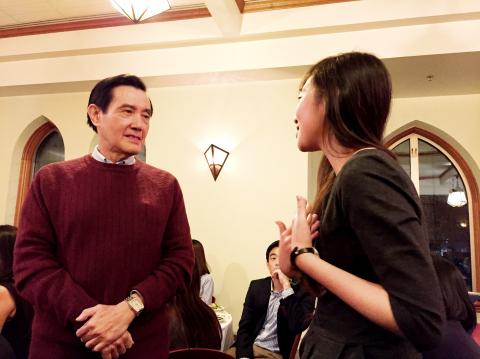Former president Ma Ying-jeou (馬英九) on Saturday called for respect for every individual’s sexual orientation, as he met with Asian students at the University of Notre Dame in Indiana to discuss a number of issues, including the value of Taiwan’s democratic system, gay rights and the importance of increased cultural exchanges with China.
He made the remarks at a forum held by the university, addressing students from Taiwan, Hong Kong, Macau and China on the subject of cross-strait relations.
Ma, on his first trip to the US since leaving office in May, began by saying that Taiwan-China relations could be “natural” if they are based on “shared daily experiences,” such as exchanges between students.

Photo: CNA
Praising Taiwan’s democratic system, Ma said that it is imperative that the decisions made by individuals in Taiwan be free of social interference, and he expressed his belief that society would make the right decision on the legislature’s draft bills to legalize same-sex marriage through the democratic process.
The former president told the students a story about Taiwan’s gay rights movement centering on a visit by a Chinese women’s rights advocate, who had been invited by a gay rights group.
“She initially did not have any fixed views of Taiwan, but after interacting with Taiwanese gay rights advocates, she was deeply touched by the efforts,” Ma said, adding that the Chinese woman spoke highly of Taiwan after her visit, leaving even her friends thinking she was a supporter of Taiwanese independence.
During his time as Taipei mayor, the city budgeted NT$1 million (US$31,240 at the current exchange rate) for activities in support of the gay community and made city land available for their use, Ma said, adding that government support has made Taipei Asia’s most gay-friendly city.
While his support of gay rights, based on human rights and humanitarianism, during his time in office have been questioned by his older relatives, Ma said he believed “an individual’s sexual orientation must be respected.”
Whether the legal definition of a “family” should be changed is another matter, but at the very least, people should not be discriminated against and their basic human rights should be safeguarded at all costs, he said.
Returning to the subject of cross-strait relations, Ma said exchanges such as that of the Chinese women’s rights advocate should be increased, because it would allow people on the other side of the Taiwan Strait to better understand the “value of Taiwan’s existence.”
Taiwan represents the most democratic environment in the “several-thousand-year history of the Chinese people,” he said.
“This does not mean that anything goes in Taiwan,” Ma said.
“It is just that people in Taiwan will not be hindered when making collective decisions,” he added.
Ma was scheduled to deliver the keynote speech at the university’s second Asia Leadership Forum yesterday before traveling to Chicago to attend a dinner with Taiwanese expatriates.
He is scheduled to return to Taiwan on Wednesday.

The disruption of 941 flights in and out of Taiwan due to China’s large-scale military exercises was no accident, but rather the result of a “quasi-blockade” used to simulate creating the air and sea routes needed for an amphibious landing, a military expert said. The disruptions occurred on Tuesday and lasted about 10 hours as China conducted live-fire drills in the Taiwan Strait. The Civil Aviation Administration (CAA) said the exercises affected 857 international flights and 84 domestic flights, affecting more than 100,000 travelers. Su Tzu-yun (蘇紫雲), a research fellow at the government-sponsored Institute for National Defense and Security Research, said the air

Taiwan is to commence mass production of the Tien Kung (天弓, “Sky Bow”) III, IV and V missiles by the second quarter of this year if the legislature approves the government’s NT$1.25 trillion (US$39.78 billion) special defense budget, an official said yesterday. Commenting on condition of anonymity, a defense official with knowledge of the matter said that the advanced systems are expected to provide crucial capabilities against ballistic and cruise missiles for the proposed “T-Dome,” an advanced, multi-layered air defense network. The Tien Kung III is an air defense missile with a maximum interception altitude of 35km. The Tien Kung IV and V

Trips for more than 100,000 international and domestic air travelers could be disrupted as China launches a military exercise around Taiwan today, Taiwan’s Civil Aviation Administration (CAA) said yesterday. The exercise could affect nearly 900 flights scheduled to enter the Taipei Flight Information Region (FIR) during the exercise window, it added. A notice issued by the Chinese Civil Aviation Administration showed there would be seven temporary zones around the Taiwan Strait which would be used for live-fire exercises, lasting from 8am to 6pm today. All aircraft are prohibited from entering during exercise, it says. Taipei FIR has 14 international air routes and

Taiwan lacks effective and cost-efficient armaments to intercept rockets, making the planned “T-Dome” interception system necessary, two experts said on Tuesday. The concerns were raised after China’s military fired two waves of rockets during live-fire drills around Taiwan on Tuesday, part of two-day exercises code-named “Justice Mission 2025.” The first wave involved 17 rockets launched at 9am from Pingtan in China’s Fujian Province, according to Lieutenant General Hsieh Jih-sheng (謝日升) of the Office of the Deputy Chief of the General Staff for Intelligence at the Ministry of National Defense. Those rockets landed 70 nautical miles (129.6km) northeast of Keelung without flying over Taiwan,